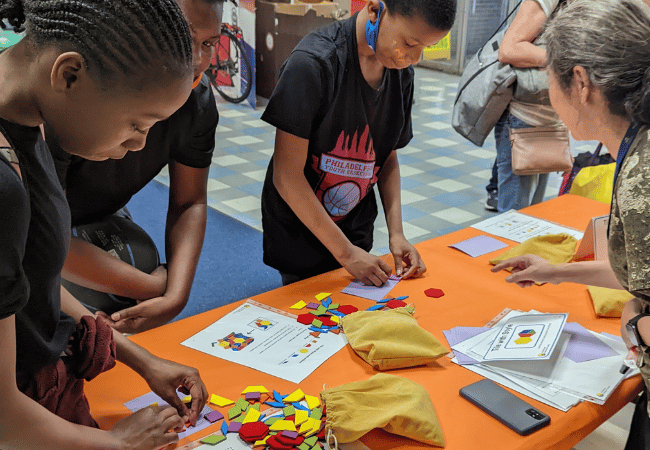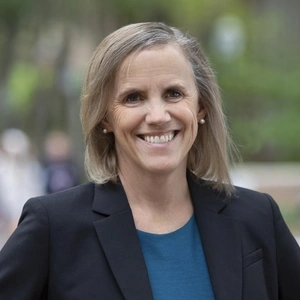Faculty Expert
Pictured: students, teachers and facilitators at a recent math festival organized by Penn GSE’s Responsive Math Teaching (RMT) project. The festivals engage students from pre-K to 8th grade in games that challenge their math skills, creativity and strategy. (Courtesy Caroline Ebby)
Earlier this week, students at Philadelphia’s Overbrook Elementary School celebrated math – with a bit of pi.
On Tuesday, March 14 – International Pi Day, an annual recognition of the mathematical constant π and a nod to its first three numbers – they attended an event organized by Penn GSE’s Responsive Math Teaching (RMT) partnership. It was one of several math festivals planned for the year to help promote math literacy and community-based learning.
A central RMT tenet is that students are more engaged when learning by doing. Caroline Ebby, an adjunct associate professor here and senior researcher with the Consortium for Policy Research in Education (CPRE), says the math festivals put that concept into practice.
“The focus is on helping students feel confident and engage in productive struggle and encouraging engagement, voice, and ownership,” Ebby explains. “The math festivals are a great way to do that.”
Volunteers facilitate the games but encourage kids to work independently or as groups.
Unlike classroom lessons, “the goal is not to teach them something but to allow them to engage and ask questions. It is all self-directed and exploratory.”
Games are designed to meet kids at their level. With cup stacking, for example, a middle schooler might work with a friend to stack seven cups into single stack following a set of rules, while a younger child starts with just two or three. The idea is to make the experience accessible to all.
“The activities meet people where they are and can play at any level,” Ebby says, adding, “It is also a wonderful way for parents to engage with their children around math.”
It takes a village to pull off the events. RMT’s Joy Anderson Davis, who coordinates the festivals, said Penn staff and students volunteer alongside local teachers, their families and community members. AmeriCorps volunteers recently pitched in at one school, and some 6th graders have trained to run activities. Anderson hopes to build a team of volunteers to staff future events.
So far, RMT has hosted about a half-dozen math festivals, including at the Penn Alexander School, Hamilton Elementary, Locke Elementary, Gompers Elementary and Lamberton Elementary.
Ebby says the response has been overwhelmingly positive.
One student identified a game called “Jumping Julia” as the most exciting activity “because every time I got confused, getting it makes me think and try again.” Another child added: “My favorite game was Domino Dissection because it was making me think.”
Importantly, the festivals are helping kids find a love of learning and building confidence.
"(They are) a way to build people’s enjoyment and help them have positive attitudes about math. They see that math can be fun and they can be good at it," concludes Ebby.
Media Inquiries
Penn GSE Communications is here to help reporters connect with the education experts they need.

